Library
All resources
1781 – 1800 of 2423 results
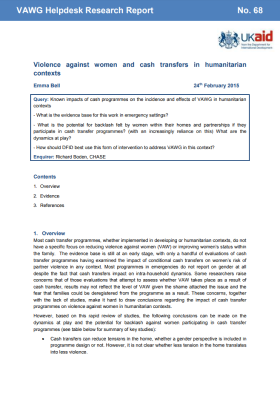
Violence Against Women and Cash Transfers in Humanitarian Contexts
Policy paper
This report addresses the known impacts of cash programmes on the incidence of violence against women in humanitarian contexts. Query: Known impacts of cash programmes on the incidence and effects of VAWG in humanitarian contexts What is the evidence base for this work in emergency settings? What is the...

Remittances to Syria: What works, where and how
Report
This study sought to understand remittance flows into Syria, and established that various Informal Value Transfer Systems (IVTS) are used, to the exclusion of the formal banking sector. Registered and unregistered hawala, courier services and family connections are used. Remittances have played an...
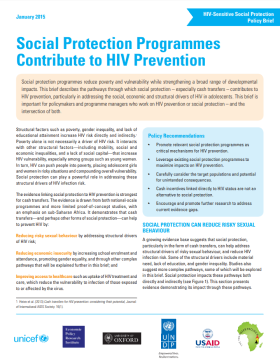
Social Protection Programmes Contribute to HIV Prevention
Policy paper
Social protection programmes reduce poverty and vulnerability while strengthening a broad range of developmental impacts. This brief describes the pathways through which social protection – especially cash transfers – contributes to HIV prevention, particularly in addressing the social, economic and...

Markets in Crises: The 2010 Floods in Sindth, Pakistan
Case Study
Floods in Pakistan in 2010 inundated a wide swath of territory, affecting 18 million people and killing approximately 2,000. The disaster also affected businesses, from some of the largest factories and most fertile agricultural land in the country to small village shops. Many businesses closed, either...
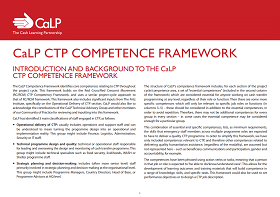
The CALP Network CTP Competence Framework
Guidelines and Tools
The CALP Network Competence Framework identifies core competences relating to CTP throughout the project cycle. This framework builds on the Red Cross/Red Crescent Movement (RC/RCM) CTP Competency Framework, and uses a similar project-cycle approach to that of RC/RCM framework. This framework also...
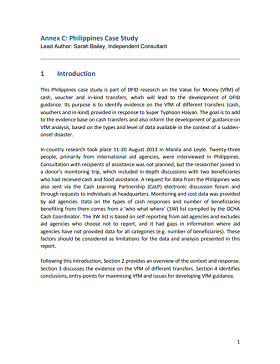
Annex C: Philippines Case Study
Report
This Philippines case study is part of DFID research on the Value for Money (VfM) of cash, voucher and in-kind transfers, which will lead to the development of DFID guidance. Its purpose is to identify evidence on the VfM of different transfers (cash, vouchers and in-kind) provided in response to Super...
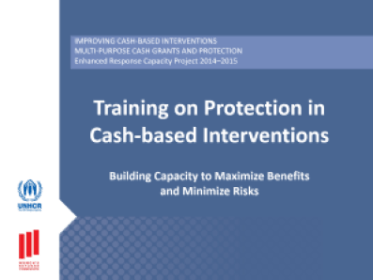
Protection in Cash-based Interventions Training: Building capacity to maximize benefits and minimize risks
Guidelines and Tools
This participatory curriculum is based on the inter-agency Guide for Protection in Cash-based Interventions (CBIs). The one-day training provides practical instruction for analysing and monitoring protection risks and benefits in CBIs. Slides, facilitators’ guide, case studies, and other materials for...
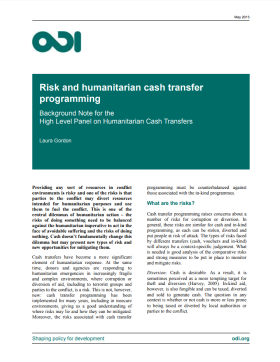
Risk and Humanitarian Cash Transfer Programming
Policy paper
Cash transfer programming raises concerns about a number of risks for corruption or diversion. Providing any sort of resources in conflict environments is risky and one of the risks is that parties to the conflict may divert resources intended for humanitarian purposes and use them to fuel the...
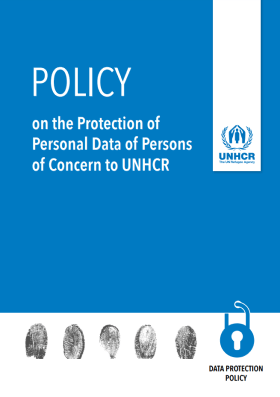
Policy on the Protection of Personal Data of Persons of Concern to UNHCR
Policy paper
This Policy lays down the rules and principles relating to the processing of personal data of persons of concern to UNHCR. Its purpose is to ensure that UNHCR processes personal data in a way that is consistent with the 1990 United Nations General Assembly’s Guidelines for the Regulation of Computerized...

Markets in Crises: South Sudan case study
Report
Not long after achieving independence, South Sudan descended into conflict, which has fuelled displacement and food insecurity.Although markets continue to function in the country, humanitarians have paid relatively little attention to market-based responses to the crisis. Looking primarily at Juba, this...

Overview: Rapid Assessment of Markets (RAM)
Report
The Rapid Assessment for Markets (RAM) provides a quick and basic snapshot of how key markets operate immediately after a shock, to support initial decision on feasibility of response options (cash vs in-kind, initial market support) and to identify whether or not more detailed market system analysis is...

Philippines Haiyan Response – A multi-sectoral review of the use of market analysis and the design and implementation of CTPs
Report
Following Typhoon Haiyan, which hit the Philippines on November 8 2014, at least 45 aid agencies chose to implement Cash Transfer Programming (CTP) to assist the more than 16 million people affected. Cash transfers were a logical approach in a country with developed market systems, strong financial...

Final Report for Assessment of the Impact of Cash For Work Beneficiaries training for Phases IIB and IV
Report
Phases IIB and IV of the Cash For Work (CFW) project were implemented by FAO Somalia over the period 2013-2015 and aimed at enhancing access to food by the food insecure households in the short-term, while supporting restoration of food production through the rehabilitation/construction of productive...
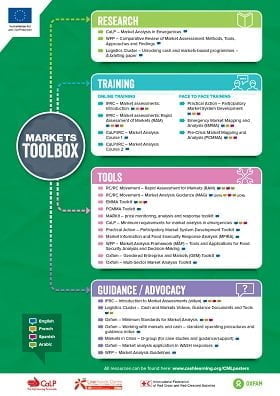
Markets Toolbox
Guidelines and Tools
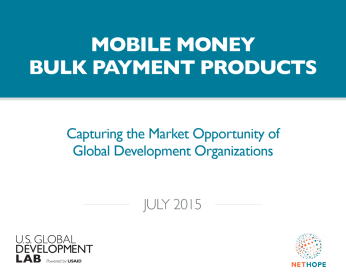
Mobile Money Bulk Payment Products: Capturing the market opportunity of global development organizations
Presentation
International relief and development organizations (DOs) receive significant aid funding from donors, which they regularly disburse in high volume, low value payments to millions of recipients for program and operational expenses. DOs and donors are increasingly using and promoting the use of new digital...

2015 State of the Industry Report. Mobile Money
Report
Mobile money is reaching more than 411 million people globally. Moreover, it is available in 85% of countries where the vast majority of the population lacks access to a formal financial institution. This is an extraordinary achievement, demonstrating the power of mobile, underpinned by the critical...

Report from the Inaugural Markets and WaSH Learning Event
Report
This report summarizes the presentations and discussions that took place during a learning event on market-based programming targeting key humanitarian stakeholders in the WaSH sector. Held on October 13, 2015 at the IFRC office in Nairobi, the event was organized under the umbrella of the Markets in...

Part 1.4 Protection Risk and Benefits Analysis
Report
All humanitarian interventions carry risks, even in-kind delivery of goods and services. Cash programming is no exception. Specific areas of risk include:
Safety and dignity.
Humanitarian access to crisis-affected populations.
Crisis-affected populations’ access to aid.
Data protection and beneficiary...
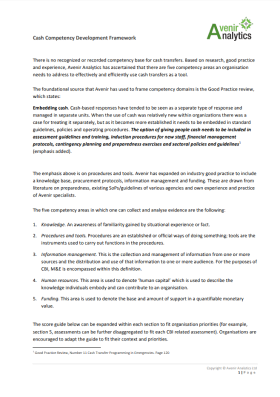
Cash Competency Development Framework
Guidelines and Tools
There is no recognized or recorded competency base for cash transfers. Based on research, good practice and experience, Avenir Analytics has ascertained that there are five competency areas as an organisation needs to address to effectively and efficiently use cash transfers as a tool.

Can Emergency Cash Transfers ‘Piggyback’ on Existing Social Protection Programmes?
Policy paper
This background note focuses on the current discussion among actors in the humanitarian and social protection sectors regarding the use of existing social protection programmes to provide an emergency response. It outlines the overlaps between social protection and humanitarian responses, considers a...